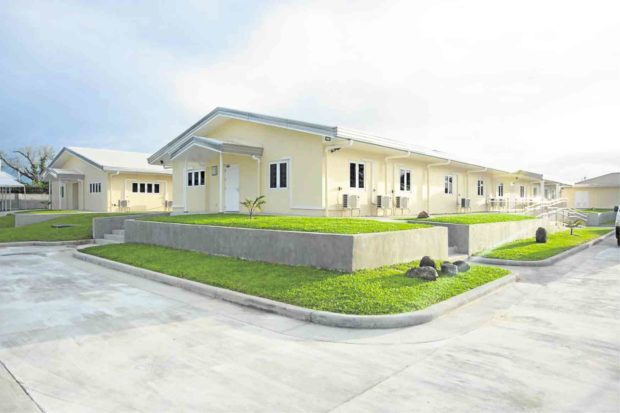
The new structures built by JW members on land where hundreds of bodies were swept by storm surge at the height of Supertyphoon “Yolanda.” —CONTRIBUTED PHOTO
TACLOBAN CITY — What used to be the grave for hundreds of bodies swept by storm surge from Supertyphoon “Yolanda” (international name: Haiyan) is now a sprawling ground for life-giving message.
The 3,800-square meter lot in Barangay 77 Fatima here, where bodies were washed away by Yolanda on Nov. 8, 2013, was transformed by Jehovah’s Witnesses (JWs) into its Remote Translation Office (RTO) where the Bible and Bible-based publications are translated in Waray-waray.
The RTO complex has 13 translation offices, a sound recording room, a dining area, a laundry room and 14 rooms that could accommodate 19 translators who waived their professional fees to work for eight hours, five days a week, said Dean Jacek, spokesperson of the Watchtower Bible and Tract Society of the Philippines, the legal and corporate arm of JWs in the country.
He said the 16 in-house translators and three other translators, who commute from their homes every day, were unpaid volunteers who pour time and effort to make sure that Bible-based literature could easily be understood by the common people.
The RTO started operating on Jan. 22, 2016, but it was opened to the public for the first time this year, according to Jacek.
Since last year, the RTO team had translated more than 100 English books, brochures and magazines which are distributed to the public for free, he said.
They are also available for download for free at jw.org, the official website of the JWs, he added.
One of the most popular titles produced by the RTO was “Kon an Usa nga Imo Hinigugma Namatay (When Someone You Love Dies)” which Jacek said was very helpful for Yolanda survivors.
Jacek admitted, though, that translating English into Waray was a challenge.
Very specific
“It tends to be more specific than English, which has a wider range of meanings,” he said.
He also cited differences in regional languages. Since there were four Waray-waray speaking provinces, what was understood in some areas might be misunderstood or even not understood in other areas, Jacek said.
Since the facility is run mainly by volunteers, several Yolanda survivors, whose houses were rebuilt by JWs after Yolanda, have made themselves available to work in the RTO without pay.